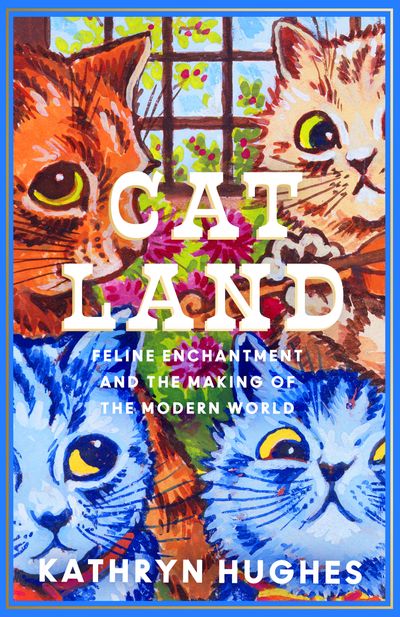Catland: Feline Enchantment and the Making of the Modern World
‘Part-biography, part-social history, Catland is its own breed of historical investigation’ Amanda Foreman
Some called it a craze. To others it was a cult. Join prize-winning historian Kathryn Hughes to discover how Britain fell in love with cats and ushered in a new era.
‘He invented a whole cat world’ declared H. G. Wells of Louis Wain, the Edwardian artist whose anthropomorphic kittens made him a household name. His drawings were irresistible but Catland was more than the creation of one eccentric imagination. It was an attitude – a way of being in society while discreetly refusing to follow its rules.
As cat capitalism boomed in the spectacular Edwardian age, prized animals changed hands for hundreds of pounds and a new industry sprung up to cater for their every need. Cats were no longer basement-dwelling pest-controllers, but stylish cultural subversives, more likely to flaunt a magnificent ruff and a pedigree from Persia. Wherever you found old conventions breaking down, there was a cat at the centre of the storm.
Whether they were flying aeroplanes, sipping champagne or arguing about politics, Wain’s feline cast offered a sly take on the restless and risky culture of the post-Victorian world. No-one experienced these uncertainties more acutely than Wain himself, confined to a mental asylum while creating his most iconic work. Catland is a fascinating and fabulous unravelling of our obsession with cats, and the man dedicated to chronicling them.
‘Brilliantly researched and unforgettable’ Miranda Seymour
‘A perfect gift for cat lovers, art lovers, and readers of all persuasions’ Elaine Showalter
‘Consistently fascinating … A tremendous literary feat’ Kirkus
'Kathryn Hughes is one of our best loved and most incisively witty social historians. Louis Wain, whose anthropomorphised kitties brought the lowly English mouser prancing into the parlours, bedrooms and even ballrooms of England, provides the biographical thread for her brilliantly researched and unforgettable portrait of Victorian times' Miranda Seymour, author of I Used to Live Here Once -
”'On Victorian and Edwardian terrain, Hughes is near-omniscient. She knows that the best Victorian cat litter came from Japan and could be purchased at a shop in Holborn, that Siamese cats were first introduced to Britain at the 1871 Crystal Palace cat show, that six billion postcards were sent between 1902 and 1910 and that one, featuring a Wain cat, found its way to Winston Churchill … Through humour elegance and sheer knowledge, Hughes builds something remarkable” - Oliver Soden, Literary Review
'Consistently fascinating … A tremendous literary feat in which we learn about Victorian sociology through the work of a remarkably unique artist' Kirkus, starred review -
”'In Catland, Kathryn Hughes combines ingenuity, insight, and immense literary charm in a study of cat culture and modernism. A perfect gift for cat lovers, art lovers, and readers of all persuasions” - Elaine Showalter, Princeton University
”'Catland is a one-off, a book of high whimsy and deep research, a work of great subtly that is also startlingly original. Part-biography, part-social history, Catland is its own breed of historical investigation. Kathryn Hughes shows us not how we see ourselves, or even how we see our cats, but how we see ourselves in our cats, for better or worse, or in T.S. Eliot’s case, better or verse” - Amanda Foreman, author of A World on Fire
